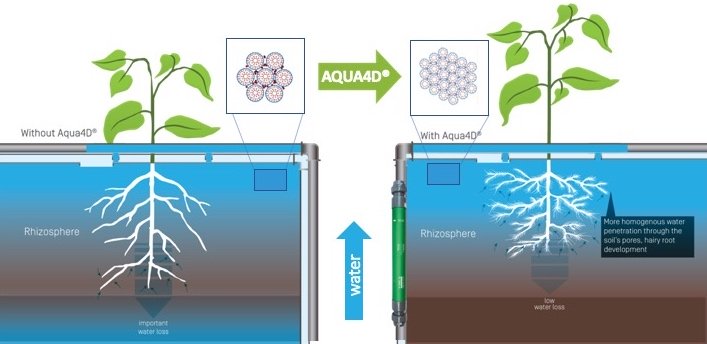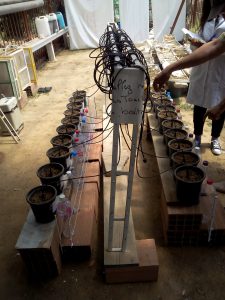Swiss technology allows irrigation with saline water
Even in the most fertile regions of the world, sustainably feeding a growing population while using less resources looks like a tall order. But in many areas, this is further impaired by unenviable local conditions.
In North Africa and the Middle East, food producers face two common and related antagonists: soil salinity and poor-quality water with high salt content.
Unsurprisingly, growers are increasingly turning to new agricultural technologies (agritech) to overcome this.
Switzerland’s Aqua4D have been gaining acclaim in salinity-blighted countries around the world from Brazil, California and the Middle East. This innovative water treatment efficiently reduces salinity in soils and negates the harmful effects of irrigating with saline water. The salts remain in the water but are so dissolved to such an extent that they no longer pose a danger or crystallize in the soil or around the roots.

AQUAD’s patented technology interacts with the way water clusters are built, leading to better homogenization and better distribution of minerals in the water.
Kübler Evapo Imaging has been used to illustrate this effect, showing the clear rearrangement of the water molecules:

So what does this mean for agricultural irrigation management?
- Salts: excess salts are leached below the root area, decreasing the salinity of the soil.
- Saline water: undesirable salts are less harmful to the plants, and cultivation with saline water is then possible.
- Fertilizers: Fertilizers are better distributed in the water, increasing efficiency in their use.
- Soils: water penetrates better into the micropores, meaning soils stay moist for longer, thus reducing irrigation frequency and saving water.
With irrigation water decreasing in quality around the world, the ability to irrigate with brackish or saline water would be a game changer for many growers. As a result, various academic institutions around the world have tested the efficacy in their local environments and conditions, including Fresno State University and Wageningen University (full list of academic studies available here).
One such scientist eager to explore this technology was Prof. Mohamed Hachicha in Tunisia, from the National Research Institute in Rural Engineering, Water and Forestry (INRGREF). He had been impressed by Aqua4D’s impact in North Africa and was keen to find out more.
Prof. Hachicha resolved to take a further look at just how far this innovation could go in solving common problems in irrigated agriculture. Several years later, his studies have involved academic institutions from all over the Middle East and North Africa.
Let’s take a look at how these theories played out in practice in these scientific studies:
2014: analysis of germination rates of corn and potato crops irrigated with Aqua4D.
– higher potato yields
– higher corn germination rates
– significant decrease in soil salinity
– reduction of sodium and chlorine levels in soil
- The authors of the study noted that the treatment “decreased significantly the adverse effects of saline water”, and that Aqua4D “plays an important role in the protection of plants as corn and potato crops against the adverse effects of salt stress.”
2015: Assessment of the salt leaching effect of Aqua4D after irrigation with saline water.
– Vast improvement of water quality
– Water savings through more efficient leaching effect
– Increase in drainage water conductivity (indicating strong leaching effect)
– Reduction of soil salinity
- The authors concluded that Aqua4D treatment “has a clear effect and positive on the improvement of salt leaching [and] a positive effect on improving water efficiency.”
2018: Analysis of the effect of Aqua4D on irrigation of barley crops with treated wastewater.
– higher volume of drainage water
– high salt content of drainage water (leaching effect)
– improved growth parameters, higher nitrogen in barley
– lower presence of contaminating germs
– lower soil pH in treated area
– lower levels of sodium, chlorine and lower soil pH
- The authors noted that the physical treatment of water by Aqua4D can “mitigate the negative effects of salinity on soils and crops”. These barley results have potentially profound positive effects for the treatment of large-scale grain crops, an area Aqua4D is actively pursuing over the coming years (see EU funding brief here.
Implications
With the quality of irrigation water decreasing around the world, and water supplies running dry, these studies by Prof. Hachicha & team have big implications for such regions: Aqua4D can allow irrigation with poor quality water or even treated waste water, without adding or taking anything away. Crucially, higher quality water can then be kept for essential human consumption.
This means that improving the efficiency of agricultural irrigation can have wider humanitarian effects far beyond the farm. Arguably, such changes have never been more important.
Further reading:
North Africa
Water treatment
Salinity


Experiment under way at INRGREF, Tunisia


